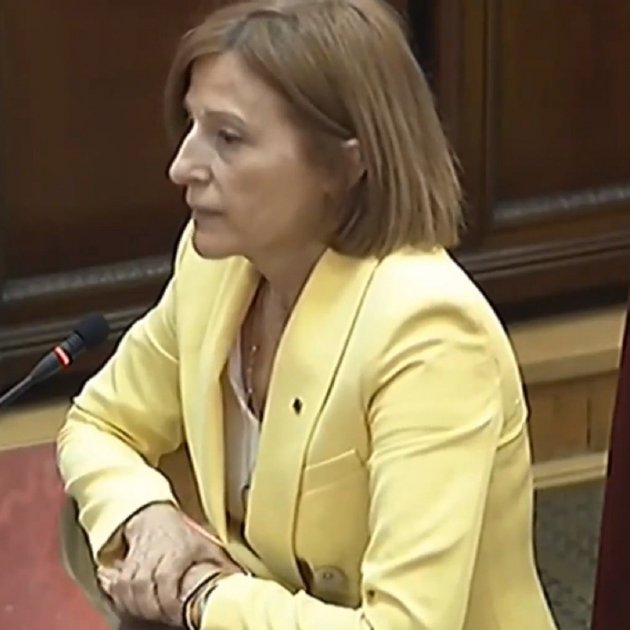Today, the last day of hearings before the judges in the Catalan trial retire to deliberate their verdicts, the defendants had their final chance to have their say in court. First up was imprisoned former vice-president Oriol Junqueras, followed by each of his colleagues in turn.
Dressed head to toe in yellow, the colour of support for those imprisoned in the case, and without any notes, former speaker of the Catalan Parliament Carme Forcadell spoke confidently and with conviction. In the past, she has been accused of being overly nervous when speaking public, not today.
"I hope you judge the confirmed facts and not the false speculations which omit reality," she said. Forcadell told the panel of judges: "I am being tried for my political career, for being who I am, not for my actions". She argued that it's "totally incomprehensible that I'm being accused of rebellion" and that the evidence had shown her actions were the same as those of the other members of the Parliament's Bureau at the time, whilst she is the only one on trial in this case and not in the High Court of Justice of Catalonia. None of her colleagues from the Bureau are facing imprisonment in that case.
The former speaker has been in prison for 447 days over charges she categorically denies. Today, she warned that there are "desperate attempts to change reality to support charges against me, like for example bestowing me with functions I didn't have because the Parliament's rules don't allow them". She also again repeated her long-held stance that the Bureau's role in the Parliament is not to censor any initiative from political parties or the public.
Forcadell faces some of the longest requested sentences in the case, as does the leader of Òmnium Cultural, Jordi Cuixart. Today he also appeared firm and sure of himself. He said he felt no regret over anything that has happened and said he would "do it again". He declared he wasn't there to defend himself or ask for a reduced sentenced, that he has accepted his actions and their consequences: "My priority isn't to get out of imprisonment, even if it's illegitimate" as it's an "unbeatable loudspeaker" to denounce the "violation of basic rights".
The other quotes
Jordi Sànchez: "Non-violence isn't passivity, it's not staying hidden. Non-violence is to accept the consequences as Socrates did, even if they are unjust and cause pain. And to accept them without wanting to create pain. Respect for others is fundamental in non-violence and that's what we did in Catalonia on 1st October [2017] and what I've done in my modest political activism since the 80s."
"To all the people who believe the trial has been long, how would you feel locked up in a prison for 604 days? Prison causes pain."
"It's hard for you [, the judges,] to resolve a political problem. But you have a responsibility to not aggravate the political situation. I wouldn't like to be in your shoes."
Raül Romeva: "They haven't been able to bring a single piece of evidence which shows why we're here. Not one. Zero."
"In this dock, we're not only 12 people, we're more than 2 million. These people won't change their opinion based on what might happen in the trial."
"We call on all those democrats in the Spanish state and beyond to be able to construct a reality where there aren't political trials, where there aren't political prisoners."
Quim Forn: "After 19 months in prison, I remain faithful to my ideals. I don't believe that's a crime. I continue to believe in and fight for democracy, liberty and justice. I continue to defend Catalonia's right to free determination, dialogue and respect for plurality as the only way to resolve conflicts."
Jordi Turull: "I am here for my ideas and because I didn't renounce my political activity."
"Everything has been worth it to the prosecutions [...] to decapitate the independence movement at any cost."
"Confusing criticism with attacks is an authoritarian mentality. Criticisms of the state's government, of Constitutional Court decisions or the police have been assimilated with attacks against the state."
"We offered the Spanish government a dialogue table, and the state's government wanted to confront it by making us sit in the dock."
Josep Rull: "Problems aren't banned, they're solved. [...] Democracy is defended with more democracy and rights with more rights."
"With my imprisonment you've decided that I can't see my children grow up, but whatever the sentence may be, I will leave them the dignity of having defended legitimate and noble ideas."
Dolors Bassa: "I didn't want to disobey the requests of the 80% of the population which demanded to vote. [...] Disobedience would have been to stand [for election] with a manifesto and not fulfil it."
"I'm innocent and I want to say it loudly and clearly."
